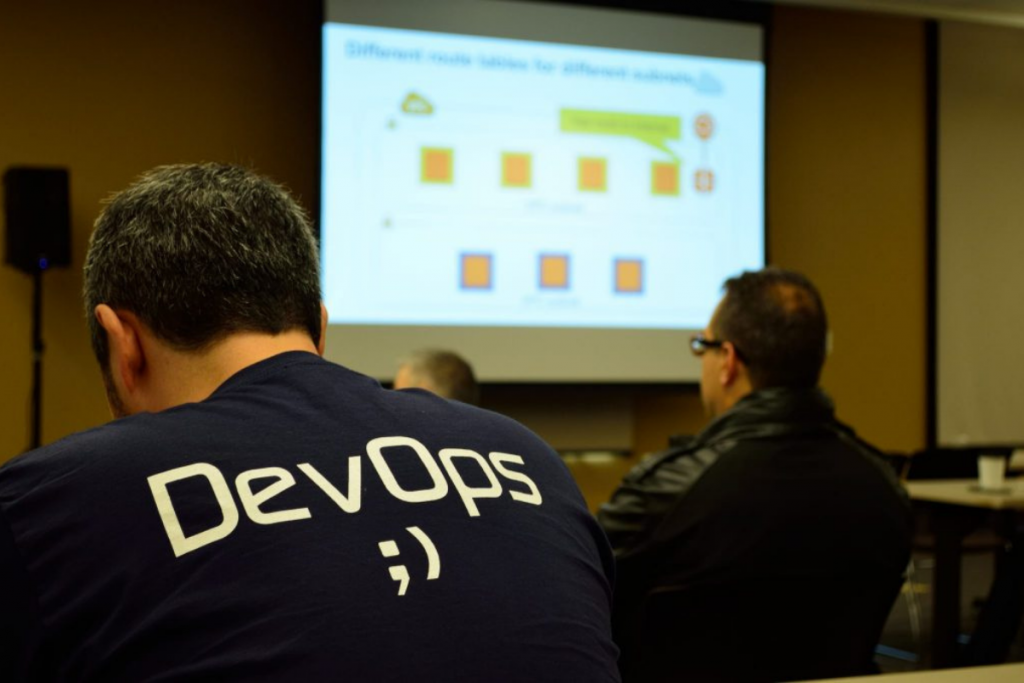
-
Apexlink
Real Estate
-
DLS
General Insurance
-
DMV
Government
-
Entiger
Fintech
-
GIS Mapping
Gas & Petroleum
-
HMS
Employee Benefit
-
HAWA
Government
-
Harley
Community
-
IHG
Hotel & Tourism
-
Sparkseeker
Humane Tech
-
Track Ninja
Sports
-
Response Vision
Disaster Management
- Artificial Intelligence
- Application Services
- Automation Services
- Cyber Security
- Chatbot Experts
- Data Analysis
- Data Warehouse Services
- Machine Learning
- Digital Commerce Services
- Digital Transformation
- Infrastructure Service
- IT Support
- IT Consulting
- IT Outsourcing
- IOS Development
- Android Development
-
Cross Platform Development
-
Gaming App Development
DevOps is the hottest trend among businesses. Developers are thriving hard to turn to be the DevOps Engineer. All in all, DevOps is genuinely becoming a rising champion of the organizations.
More than 50% of the organizations have implemented DevOps in the last two years. So the future is all set with the operations and development together carried out by the companies.
Most of the professionals wonder whether its concepts are entirely different or applied to certain company projects. However, it is the most examined point, and when it is planned in a specific way, it can help the businesses to improve efficiency.
What is DevOps?
DevOps brings the teams, processes, and technology altogether to provide better products to consumers more quickly. DevOps allows formerly segregated functions – the development department, IT operations, quality engineering, and security – to interact and coordinate to create better, more enriched products. Teams may better respond to customer demands, enhance trust in the apps they develop and achieve business goals quicker by adopting a DevOps culture and using DevOps techniques and technologies.
Importance of CI/CD for DevOps:
The CI/CD for DevOps is a continuous integration and continuous development. These are taken out of the conventional methods. The companies that are using DevOps have to work with the waterfall methodologies in the infinite loop. If it is done well, then you can quickly deploy the project number of times depending upon the DevOps approach. The end-user might not even be aware that anything has changed. Such developments are getting much preference these days within the companies. If you are making your mind to this huge change, it is worth considering your business.
People tend to ask lots of questions as they doubt the capability of DevOps. Seasia Infotech has answered many, and if you missed it, here below we are jotting answers to some of your asked questions.
What does a DevOps engineer do?
It must be known to everyone that the DevOps Engineer never codes from scratch, but they are familiar with the software development languages and the tools to generate the code and update the existing one. The DevOps Engineer would coordinate with the operations staff while working with the development staff. It brings the balance between coding and scripting, connecting the code elements like software development kits and integrating other essential components that run both the operating and production frameworks.

They are also required to manage the IT infrastructure that is fully dedicated to hybrid cloud environments. It is basically the cross-function job role that either has to take a role on the developers' operations. They need to have an eye on whether the software is developed or further deployed in the quest applications.
Do you know how hiring a DevOps engineer can benefit your business and the scope of your project?
- Your development and IT departments' diverse components operate better together.
- You'll be able to release product upgrades more rapidly.
- You can automate several internal procedures and free up hours of time to work on other projects.
What is DevOps example?
Look, the DevOps applications are not limited to a specific industry. In fact, it is widely known in the current environment. Starting with its applications in an online financial trading company, it automates the testing, building, and development of the methodologies. Deployment can be done rapidly and several times where the ordinary operations take up days to weeks for the completion. Therefore, the overall time for the particular processes has been reduced while making it easy and engaging the clients. If we talk about the manufacturing industries, it can easily catch the error in scaling the production, which wasn't even possible with the earlier operations.
In fact, with the introduction of DevOps, bugs have got lessened by about 35%. If you pick up the software and perform regression testing, then you would see how it has massively reduced the time and made a better experience for the clients and customers. DevOps is performing it rapidly with a hold of good speed for the deployment and delivery of the applications. So, this faster development of the organization is best for your organization's best development and functioning.
What are the 7 DevOps practices?
DevOps is a profession or the concept that holds knowledge on the Software Development Life Cycle and builds the processes, tools, and methodologies to develop CI/CD pipelines. Not just this, it is responsible for the provisioning, operations, and managing of the cloud environments. Now, let us dive into the DevOps culture or, say, DevOps practices.
1. Continuous Integration:
It is a software development method in which developers integrate their code changes into a common repository regularly and then perform automated builds and tests. Continuous integration's primary goals are to discover and fix issues faster, improve software quality, and shorten the time it takes to verify and distribute new software upgrades.
2. Continuous Delivery:
It is a software development method in which scripts are created, tested, and delivered into the production environment automatically. After the code is created, it deploys all code updates to testing or production environments. Thus, when it is properly designed, developers will always have deployable build artifacts that have passed a standardized test procedure.

3. Microservices:
Microservices is an architectural strategy in which an application is built and structured as a collection of microservices. Microservice architecture is another name for it. Each service is meticulously maintained and tested, loosely linked, deploys independently, and is structured around various business functions. A small group of the team owns and manages all of the services. The microservice design enables sophisticated and large-scale mobile applications to be delivered quickly, consistently, and reliably. It also allows a company's technological layer to grow.
4. Continuous Testing:
It is another practice or software testing method that entails automated software testing throughout the software development life cycle. Its goal is to test software quality at each stage of the continuous delivery process in order to assess software quality.
5. Configuration Management:
Developers and system administrators use code to automate the operating system, host configuration, and operational duties, among other things. Configuration changes are more repeatable and standardized when code is used. It makes it easier for developers and system administrators to configure operating systems, system applications, and server software without performing it manually. It allows developers to define and maintain consistency in an application's functional needs and performance.
6. Continuous Monitoring:
It refers to the automated method and technology required to incorporate Monitoring or tracking across all phases of your DevOps and IT operations lifecycles. In fact, it's an important step in the DevOps process. It assists in ensuring the health, performance, and dependability of your application and infrastructure as it progresses from development to production. Continuous Monitoring builds on Continuous Integration and Continuous Deployment (CI/CD) principles, allowing you to create and deploy software more rapidly and reliably for your consumers.
7. Continuous Learning:
DevOps teams that operate well have a growth mentality. They fail quickly and learn from their mistakes, improving and boosting customer happiness while also encourages innovation and market adaptation. DevOps is a never-ending journey. So, giving a chance to the DevOps engineer or the company that has the pack must be benefitting your business.
Effective Communication And Cooperation In A Clear Environment
Some of the significant components of DevOps include increased communication and cooperation and increased visibility within a business. By practically collecting the processes and responsibilities of development and operations teams, DevOps tools and automation of the software delivery process promotes cooperation away much better.
Furthermore, by integrating chat apps, issue or project tracking systems, such teams establish strong cultural standards for information sharing and communication. This improves and speeds up communication between developers, operations, and other teams like marketing and sales, allowing all parts of the company to work together more closely on objectives and projects.
What comes under DevOps?
The DevOps includes the space of several iterations of the development and IT operations pattern.
1. The Plan:
- Organize and arrange your operations.
- The project manager puts up the tools for managing the project's infrastructure.
2. The Code:
- Codes are written by developers.
- Review the codes using source code management tools.
- Once the codes have been evaluated; the system administrators integrate them.
3. The Build:
- Create artifacts and source code in the format you want.
- Use CI/CD technologies to validate source codes once engineering teams have completed their work.
4. The Test:
- To ensure excellent quality, incorporate testing tools into your process.
- Gathering of information about business risks and evaluation of performance
5. The Package:
- Implement software repository tools in accordance with corporate needs and goals.
- Ensure that the package and key practices are in good working order.
- Use a deployment tool to import the package.
6. Release:
- Changes would be managed.
- Approve the release of the software.
- App delivery and release automation
7. Operate:
- The operation department is in charge of maintaining, Monitoring, and troubleshooting applications.
- The security is checked by security professionals.
- Data backups and logs may be recovered and managed.
8. Monitor:
- Service performance is monitored by operations.
- Keep track of the logs
- Manage the incident as well as the end-user experience.
How can your business be benefitted from DevOps?
You will get the total removal of the ongoing operational cost. There will be an increase in the deployment rate for the new software releases. With the best team, you may get standard error-free work environments.
For your projects,
- High Speed
- Rapid Delivery
- Enhanced Collaboration
- Improved Security
- Early error detection
- Huge Scalability
- Production Support
What does choosing the right partner in DevOps to refer to?
Finding a suitable technology for your business is your one win-win situation but finding the right partner to implement is your victory for business. Therefore, it is important to implement the right package of solutions to gain a competitive edge.
With the expertise team in the advanced DevOps, Seasia Infotech helps drive a culture of "All under a single package" with the help of our complemented teams, framework, and tools. Our processes are so quick and get-to-the-market that we don't leave any single stone unturned to turn your idea into a reality within a lower timeframe and cost.
Concludingly, DevOps has turning out to be the most imperative tool or concept for any organization. It is proved to be a great asset as it has a wide range of applications as well as benefits.
Change the development and operations culture with DevOps today!







 Artificial Intelligence
Artificial Intelligence
 Blockchain
Blockchain Cloud Computing
Cloud Computing Infrastructure
Services
Infrastructure
Services Metaverse
Metaverse QA
Automation
QA
Automation UI/UX
UI/UX








